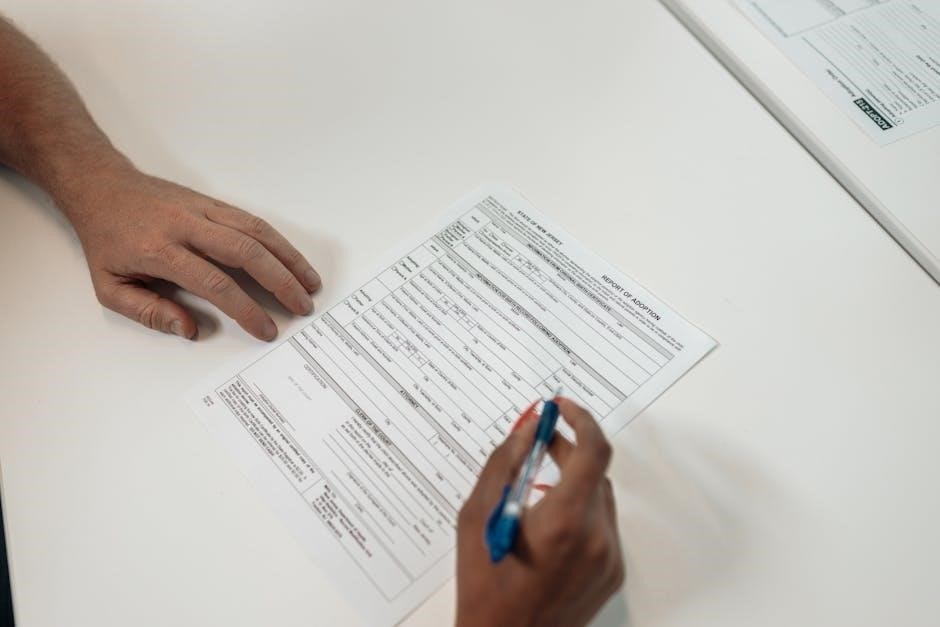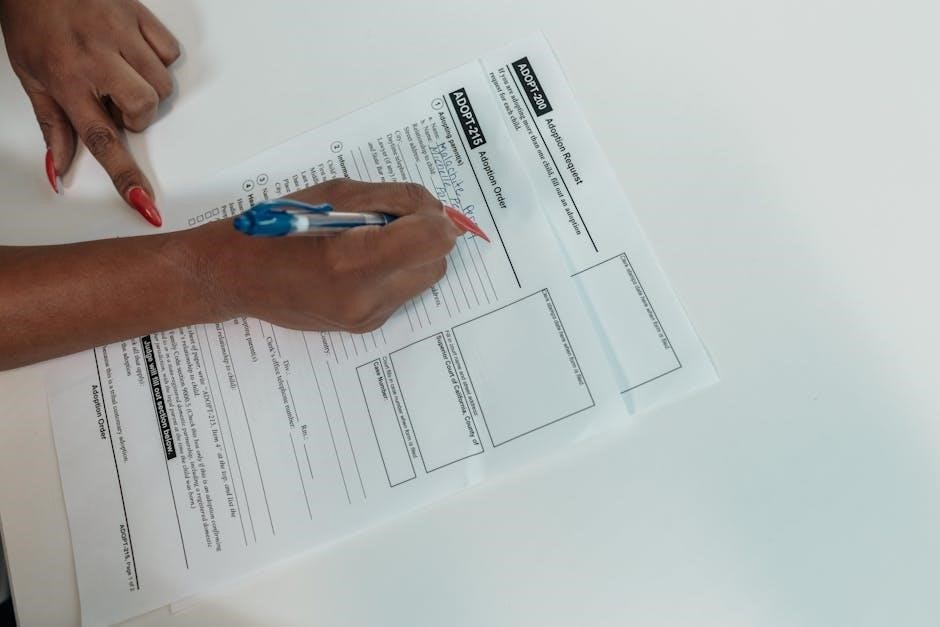
The British Columbia Rental Application Form is a crucial document used by landlords to assess potential tenants. It streamlines the rental process, ensuring compliance with local regulations and fostering transparency between landlords and tenants.
1.1 Purpose of the Rental Application Form
The purpose of the British Columbia Rental Application Form is to provide landlords with essential information to evaluate potential tenants; It collects personal, financial, and rental history details, helping landlords assess reliability and suitability. This standardized process ensures transparency, fairness, and compliance with provincial tenancy laws, protecting both parties’ interests.
1.2 Importance of the Form for Landlords and Tenants
The British Columbia Rental Application Form is vital for landlords to evaluate applicants’ credibility and financial stability. For tenants, it ensures a fair and transparent process, protecting against discrimination. The form also promotes legal compliance, safeguarding both parties’ rights under the Residential Tenancy Act and fostering a mutually respectful rental relationship.

Required Information on the British Columbia Rental Application Form
The form requires personal details, rental history, employment information, and financial data to help landlords assess applicants’ suitability while ensuring compliance with tenancy regulations.
2.1 Personal Details of the Applicant
The application requires basic personal information such as the applicant’s full name, date of birth, contact details, and social insurance number. This helps verify identity and assess suitability for tenancy, ensuring landlords can make informed decisions while adhering to legal and privacy standards.
2.2 Rental History and References
The form requests detailed rental history, including previous addresses, tenancy dates, and landlord contact information. Applicants must provide references, often from past landlords or property managers, to verify their reliability as tenants and assess their rental behavior and history.
2.3 Employment and Income Information
The application requires details about the applicant’s current and past employment, including job titles, employers’ contact information, and durations of employment. Income verification is essential, with applicants often providing proof of earnings through pay stubs, employment letters, or bank statements to demonstrate financial stability and ability to meet rental obligations.
2.4 Financial and Credit Information
The application may request bank statements, credit reports, and other financial documents to assess the applicant’s financial stability. This information helps landlords evaluate the applicant’s ability to pay rent consistently. Credit scores and histories are often reviewed to gauge financial responsibility and potential risks associated with renting the property.

Supporting Documents for the Rental Application
Supporting documents for a BC rental application typically include identification, proof of employment, credit reports, and rental history to verify an applicant’s credibility and financial stability.
3.1 Identification Documents
Identification documents, such as a valid government-issued ID, passport, or driver’s license, are essential to verify the applicant’s identity. Additional documents like a Social Insurance Number (SIN) card may also be requested to ensure credibility and prevent fraud during the rental application process in British Columbia.
3.2 Proof of Employment and Income
Applicants must provide proof of employment and income, such as recent pay stubs, an employment letter, or bank statements. This documentation helps landlords assess the applicant’s financial stability and ability to pay rent consistently. It is a critical component of the rental application process in British Columbia.
3.3 Credit Reports and Financial Statements
Credit reports and financial statements are essential for verifying an applicant’s financial health. They provide insights into credit history, debt levels, and financial stability, helping landlords assess the risk of renting to an applicant. These documents are often required alongside other proofs of income and employment to ensure a comprehensive evaluation of the applicant’s financial standing.
3.4 Rental History Verification
Rental history verification involves contacting past landlords to confirm an applicant’s tenancy behavior and payment reliability. It also includes reviewing condition inspection reports and checking for any disputes or evictions. This step helps landlords assess potential tenants’ responsibility and adherence to rental agreements, ensuring a more informed decision-making process.

Legal Considerations for the Rental Application Process
The rental application process in British Columbia must comply with the Residential Tenancy Act and the Human Rights Code, ensuring fair and lawful tenant screening practices.
4.1 British Columbia Residential Tenancy Act
The British Columbia Residential Tenancy Act governs the rental process, balancing landlord and tenant rights. It regulates rent increases, evictions, and tenancy agreements, ensuring fairness and legal compliance. The Act also outlines dispute resolution processes through the Residential Tenancy Branch (RTB), providing a framework for addressing conflicts and enforcing rental obligations effectively.
4.2 Human Rights Code Compliance
The British Columbia Human Rights Code prohibits discrimination in rental practices based on race, gender, disability, or other protected characteristics. Landlords must ensure their application processes are fair and non-discriminatory, avoiding questions or criteria that could unfairly disadvantage applicants.
4.3 Role of the Residential Tenancy Branch (RTB)
The Residential Tenancy Branch (RTB) oversees the rental process in British Columbia, ensuring compliance with the Residential Tenancy Act. It provides forms, mediates disputes, and offers guidelines for landlords and tenants, helping to resolve issues fairly and efficiently while protecting both parties’ rights.

The Application Process and Submission
The British Columbia rental application process involves completing the form accurately, attaching required documents, and submitting it to the landlord for review and approval.
5.1 Steps to Complete the Application Form
To complete the British Columbia rental application form, gather personal details, rental history, and employment information. Fill out each section accurately, ensuring all fields are completed. Review the form for errors and attach required supporting documents, such as identification, proof of income, and rental references. Ensure all information is truthful to avoid delays in processing.
5.2 Submission Methods and Timelines
Applications can be submitted online, by email, or in person, depending on the landlord’s preference. Ensure all required documents are attached. Processing typically takes 2-5 business days, but may vary. Follow up with the landlord to confirm receipt and inquire about the status if no response is received within the expected timeframe.
5.3 Processing and Approval Procedures
Landlords review applications, verifying employment, credit, and rental history. They may contact references or request additional documentation. Processing typically takes 2-5 business days. Once approved, tenants receive a lease agreement outlining terms. Ensure all details are reviewed carefully before signing. Approval is subject to meeting all specified criteria and landlord discretion.

Tenant Rights and Responsibilities
Tenants have the right to fair treatment and privacy. They must provide accurate information, pay rent timely, and maintain the property. Understanding rights ensures a smooth rental experience.
6.1 Understanding Tenant Rights in British Columbia
Tenants in British Columbia are protected under the Residential Tenancy Act, ensuring rights like fair treatment, privacy, and habitable living conditions. They are entitled to receive written agreements and cannot be evicted without cause. Understanding these rights helps tenants navigate the rental process confidently and address any disputes effectively with landlords or the Residential Tenancy Branch (RTB).
6.2 Responsibilities of Tenants During the Application Process
Tenants must provide accurate and complete information on the rental application, including personal, employment, and rental history details. They are responsible for submitting required documents and paying any associated fees. Tenants should also respect deadlines and follow up to ensure their application is processed efficiently, maintaining open communication with the landlord throughout the process.

Landlord Obligations and Best Practices
Landlords in British Columbia must comply with legal standards, ensuring fair tenant screening and maintaining applicant confidentiality. They should provide clear application instructions and keep detailed records.
7.1 Fair Screening Practices for Applicants
Landlords must follow fair screening practices, ensuring compliance with the Human Rights Code. They should use consistent criteria for all applicants, avoiding discrimination based on race, gender, or other protected characteristics. Evaluating applicants based on financial stability, rental history, and creditworthiness is recommended. Transparency in the screening process fosters trust and ensures equal opportunity for all potential tenants.
7.2 Maintaining Confidentiality of Applicant Information
Landlords must maintain the confidentiality of applicant information to comply with privacy laws. Personal and financial details provided on the rental application form should be stored securely and accessed only by authorized individuals. Sharing such information without consent or using it for unauthorized purposes is prohibited and may lead to legal consequences.

Common Mistakes to Avoid
Applicants often make errors in providing accurate rental history or omitting essential details; Missing deadlines or submitting incomplete forms can delay processing and reduce approval chances.
8.1 Errors in Application Completion
Common mistakes include incomplete or inaccurate information, such as typos, missing contact details, or incorrect rental history. Applicants may also overlook sections, leading to delays or rejected applications. Ensuring all fields are filled correctly and double-checking for errors is crucial to avoid processing issues and improve approval chances.
8.2 Omissions in Supporting Documentation
Omissions in supporting documents, such as missing identification, proof of employment, or rental history, can delay or complicate the application process. Tenants should ensure all required documents, like credit reports and income verification, are included to avoid rejection or additional screening steps.

Regional Variations in Rental Applications
Regional variations in British Columbia may exist due to local demand, municipal bylaws, or economic conditions, affecting rental application requirements in different areas.
9.1 Differences in Requirements Across British Columbia
While the British Columbia Rental Application Form is standardized, regional differences may occur due to local demand, economic conditions, or municipal bylaws. Some areas might require additional documentation or have variations in processing timelines, reflecting local rental market dynamics and tenant-landlord interactions.

Tips for Tenants and Landlords
Tenants should ensure accuracy and transparency in their applications, while landlords should maintain clear communication and efficient processing. These practices foster mutual trust and successful rental outcomes.
10.1 How Tenants Can Improve Their Chances of Approval
Tenants can enhance their approval chances by submitting complete and accurate applications, providing all required documents promptly, and maintaining a positive rental history. Dressing professionally and being honest about financial and employment details also builds trust. Offering to sign a longer lease or providing references can further strengthen their application.
10.2 How Landlords Can Streamline the Application Process
Landlords can streamline the application process by using standardized templates and clearly outlining requirements. Ensuring timely communication with applicants and maintaining organized records helps efficiency. Implementing digital application management systems can also reduce paperwork and improve transparency.
The British Columbia Rental Application Form is essential for a smooth tenancy process, ensuring both landlords and tenants uphold legal standards and maintain transparency throughout the rental journey.
11.1 Final Thoughts on the British Columbia Rental Application Form
The British Columbia Rental Application Form is a vital tool for landlords and tenants, ensuring compliance with legal standards like the Residential Tenancy Act. It streamlines tenant screening, promotes transparency, and protects both parties. Tenants should prepare thoroughly, while landlords must follow fair practices. This form fosters a balanced and respectful rental relationship, benefiting all involved in the process.